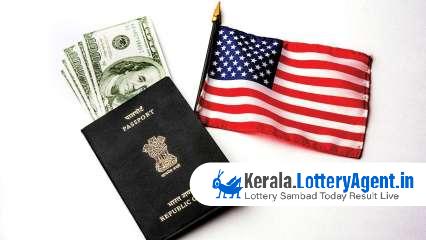
The United States will conduct a rare second lottery for the H-1B visa, as announced by the US Citizenship and Immigration Services (USCIS). This step aims to decide the successful candidates and grant another chance to hundreds of Indian IT professionals who were not selected in the initial round of the lottery.
The decision emerged after the USCIS determined that the earlier computerised draw of lots for H-1B visas, conducted earlier this year, did not meet the required quota stipulated by the US Congress.
“We recently determined that we needed to select additional registrations to reach the Fiscal Year (FY) 2022 numerical allocations. On July 28, we selected previously submitted electronic registrations using a random selection process,” the USCIS disclosed in a statement, as reported by PTI.
The H-1B visa is highly coveted, particularly among Indian IT professionals. This non-immigrant visa enables US companies to employ foreign workers in specialty occupations requiring theoretical or technical expertise. US technology companies hire tens of thousands of employees each year from countries like India and China through this visa program.
According to the USCIS statement, the petition filing period based on registrations selected on July 28 will commence on August 2 and conclude on November 3. Individuals with selected registrations will find their myUSCIS accounts updated to include a selection notice detailing when and where to file.
Only petitioners with selected registrations for the Financial Year 2022 are eligible to file H1-B cap-subject petitions, the US federal agency said. The initial filing period spanned from April 1, 2021, to June 30, 2021, PTI reported.
The significance of the H-1B visa in the tech sector cannot be overstated. As one of the primary channels for skilled foreign nationals to work in the United States, it has become a critical component of staffing for numerous US tech companies. These firms rely on the robust talent pool from countries like India to maintain their competitive edge in the global technology landscape.
However, the program has faced scrutiny and calls for reform over the years.
. Critics argue that the H-1B visa system can be exploited by companies looking to underpay foreign workers in comparison to their American counterparts. Moreover, there have been concerns about the program’s impact on the domestic labor market.
In response to such critiques, the US government has periodically adjusted the rules and regulations surrounding the H-1B visa. Despite these changes, the demand for H-1B visas continues to outstrip supply, necessitating the use of a lottery system to allocate the limited number of visas available each year.
The decision to hold a second lottery is particularly significant for Indian IT professionals. India remains one of the largest sources of H-1B visa recipients. The additional lottery offers a renewed chance for these professionals to secure work opportunities in the United States, which can be a significant career milestone.
For companies that rely heavily on H-1B workers, the second round of the lottery provides a potential lifeline to fulfill their hiring needs. As the tech industry faces a persistent skills gap, the ability to bring in specialized talent from abroad remains a crucial strategy for addressing workforce shortages.
The USCIS’s move also reflects the broader challenges of managing immigration policies in a way that balances economic needs with regulatory mechanisms. As the agency navigates these complexities, the announcement of a second lottery indicates an effort to adapt to the evolving demands of the labor market.
This development underscores the importance of transparent and efficient systems to manage immigration and visa allocation. It highlights the USCIS’s role in responding to the dynamic landscape of the US workforce and the ongoing need for skilled professionals in key sectors.
As the petition filing period begins on August 2 and runs through November 3, all eyes will be on the outcomes of this second lottery. For many aspiring H-1B visa holders, this marks another critical opportunity to realize their ambitions of contributing to the US economy and advancing their professional careers.












